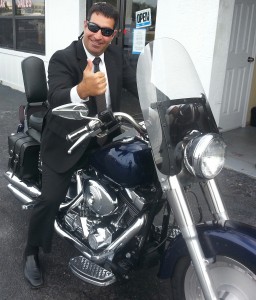Project LIFT will be raffling off a meticulously maintained 2000 Harley Davidson Fat Boy, with 17,000 miles and lots of chrome. It’s valued at over $12,000! Tickets are priced at $100 a piece. Only 200 tickets will be sold for entry to win this beauty. The raffle will be held on December 24, 2013. Contact Us to purchase tickets.
The bike is incredible. The cause that the proceeds will help fund is even better. Project LIFT (Life Initiatives for Teens) is a non profit organization with a primary focus on the lives of “at-risk” youth.
By introducing skills that will inspire youth to explore opportunities to be successful outside of delinquent behavior, Project LIFT challenges youth both physically and mentally while they interact with positive mentors. Project LIFT is committed to creating independent, competent and productive citizens of the community.
The project is a multi-systemic program designed to build on the strengths of at-risk youth. Project LIFT utilizes evidence-based practices rooted in a Substance Abuse Model of Motivational Interviewing, and combines substance abuse treatment with mental health therapies, leadership group training and mentoring. These therapies, combined with the unique opportunity to give back to a community in need and an opportunity to gain employment through on-the-job vocational instruction, add an overall benefit for not only the members but the community as a whole. Peers benefit from a paradigm shift that ripples into positive interactions with each other, their authority figures, their community and their family.
Project LIFT Turns Takers Into Givers
One of the fundamental components of Project LIFT’s program is the community give back. Members learn automotive repair skills on cars that are donated to the organization. With the help of a professional mechanic, the members restore the vehicles to safe, working order. They then help to select a family in need to give the vehicle to. This process of giving back has proven to be a real eye opener for the at risk members, as they realize the satisfaction and value of hard work for the benefit of others.
Why Project LIFT is Different
Other organizations that address similar issues don’t take the time to focus on the number of people who lose their jobs as a result of substance abuse or misuse, depression, anxiety, anger and family functional issues.
Currently in Martin County, there is no other program in the out-patient setting that addresses the need to learn a skilled trade while also learning how to deal with and overcome mental health and substance abuse issues.
According to Pew Public Safety, Public Spending Report, 50 percent of offenders who enter a commitment program will return to a program within 3 years. By contrast, Project LIFT’s return rate is less than 15%! That’s because Project LIFT was specifically designed to provide a plan that can help to lower that return rate by preparing youth to live crime free and by teaching members a trade and equipping them with coping skills to deal with the challenges of depression, anxiety, anger, and substance abuse.
If you would like to learn more about Project LIFT, Contact Us for more information.
Who Are “At-Risk” Youth? |
“At-risk” youth can mean a number of different things. Below is a list of events or situations that meet at-risk youth criteria:
Research shows that at-risk youth have much higher rates of mental illness than other youth and are less likely to receive help for their underlying problems. In fact, juvenile offenders with untreated mental health problems are likely to become repeat offenders. |
